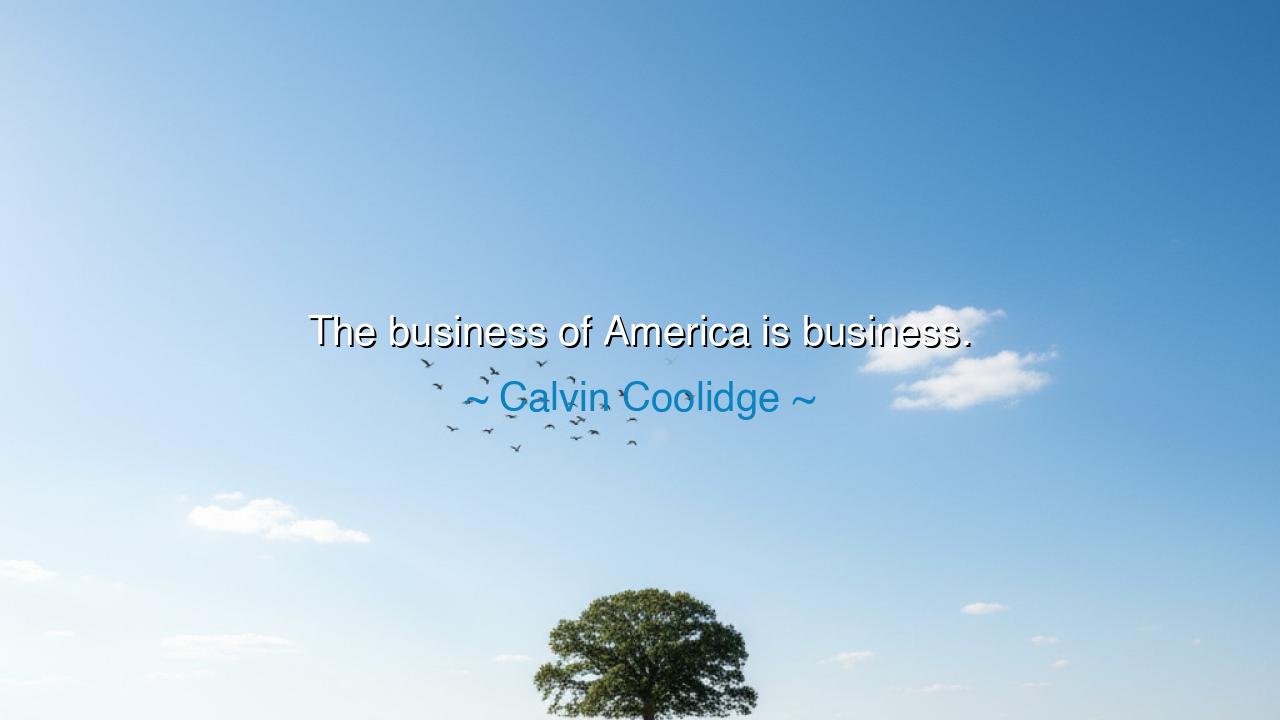
The business of America is business.






Host: The office tower gleamed under the late afternoon sun, its glass façade catching the light like a cathedral built to worship ambition. Inside, the hum of machines, phones, and voices created a rhythm — the heartbeat of commerce. The city outside was alive with movement: cars pulsing through intersections, advertisements flashing across giant screens, the air itself thick with transaction.
Jack stood by the window of the 47th floor, looking down at the city below. His reflection in the glass looked tired but satisfied — the face of a man who had won often enough to forget what losing taught him. Behind him, Jeeny sat at a sleek conference table littered with contracts, coffee cups, and the remains of another “working lunch.”
Jeeny: (leaning back, with quiet irony) “Calvin Coolidge once said, ‘The business of America is business.’”
Host: Her voice was soft but precise, each word cutting through the sterile hum of the air conditioner. Jack turned from the window, his grey eyes narrowing as if weighing the line like a market trend.
Jack: “That’s the most honest thing any president’s ever said.”
Jeeny: (raising an eyebrow) “Honest, maybe. But not noble.”
Jack: “What’s wrong with honesty? He wasn’t wrong. This country runs on deals — not dreams. Always has.”
Host: The city glimmered behind him — the skyline an altar to profit. A jet trailed across the horizon like a silver signature of modern faith.
Jeeny: “But that’s the problem, Jack. If business becomes the business of everything, what happens to the soul? To art? To ethics? To grace?”
Jack: (shrugging, half-smiling) “Grace doesn’t pay the rent.”
Jeeny: (leaning forward) “Neither does greed forever.”
Host: The room filled with silence — not uncomfortable, but sharp. The kind that carries truth waiting to be unpacked.
Jack: “Look, Jeeny, Coolidge wasn’t glorifying greed. He was describing reality. America’s engine is commerce. The dreamers invent; the sellers scale; the consumers believe. That’s how we built this.”
Jeeny: (gesturing toward the window) “Built what? Towers? Markets? Or illusions that collapse every decade?”
Jack: “Progress. Imperfect, maybe — but progress. Business funds innovation, education, medicine, defense. Without capital, even compassion collapses.”
Jeeny: (softly) “And yet, when business becomes the compass, morality becomes negotiable.”
Host: The light from the window softened, spilling golden over the glass table — their reflections merging and splitting with each word.
Jack: “Tell me something, Jeeny — do you think the farmer, the engineer, the coder, the banker — any of them wake up for ideology? No. They wake up to survive. Business isn’t corruption; it’s continuation.”
Jeeny: “Continuation of what? The rat race? The illusion that numbers equal worth?”
Jack: (quietly, almost defensive) “The alternative is chaos. Without business, there’s no structure — just idealists arguing while the lights go out.”
Jeeny: “Maybe the lights should go out sometimes. Maybe darkness is how people remember what light actually means.”
Host: The sun dipped lower now, painting the city in bronze. The office lights flickered on automatically — sterile, efficient, emotionless.
Jeeny: (after a pause) “You know what I think Coolidge really meant? That commerce had replaced conscience as America’s defining faith.”
Jack: (sipping his coffee) “And maybe that’s not a bad thing. Business gives people something to believe in — tangible, measurable, real.”
Jeeny: “But faith without mercy always ends in collapse. Look at 1929. Look at 2008. Every time we forget people aren’t profit margins, the system reminds us.”
Host: The air felt heavier now — the hum of the city below growing louder, more mechanical, as if echoing the tension inside the room.
Jack: “You’re romanticizing. Humanity’s messy. Business at least tries to make the mess productive.”
Jeeny: (softly) “No, Jack. It tries to monetize the mess. There’s a difference.”
Host: He looked at her — long, searchingly — his expression caught between frustration and admiration.
Jack: “You sound like you hate capitalism.”
Jeeny: “I don’t. I just don’t think it should be holy.”
Host: The skyline behind them began to glow — towers lighting up one by one, windows becoming constellations of human effort, exhaustion, and endless pursuit.
Jack: “You can’t separate America from business. It’s our shared language. Our heartbeat.”
Jeeny: “Maybe. But when profit becomes purpose, we stop speaking anything else. We stop asking who we are beyond what we sell.”
Jack: (quietly) “And yet the world buys from us — because deep down, everyone wants what we’re selling: freedom through transaction.”
Jeeny: “Except freedom can’t be sold. The moment you sell it, it’s gone.”
Host: Her words landed softly, like the closing note of a song that’s too true to argue with. Jack set his cup down, staring at the steam curling upward — vanishing, beautiful, temporary.
Jack: (after a long silence) “So what’s the alternative, Jeeny? What’s the new gospel?”
Jeeny: (smiling faintly) “Not a new gospel. Just a reminder. That business should serve life, not the other way around.”
Host: The camera drifted back, capturing the two of them framed against the city’s glittering skyline — wealth and weariness entwined.
Because Calvin Coolidge wasn’t entirely wrong.
Business is America’s pulse —
its strength, its ambition, its relentless motion.
But what he didn’t say — what history keeps teaching —
is that unchecked pursuit can turn the pulse to panic,
the dream to debt,
the nation to a marketplace too loud to remember its own song.
Jeeny: (softly, looking out the window) “Maybe the business of America should be balance.”
Jack: (nodding) “Maybe that’s the one thing we can’t afford to sell.”
Host: The camera lingered — the glass towers glowing like silent sermons against the night.
Because commerce may drive a nation,
but conscience keeps it human.
And in that fragile space between profit and purpose,
America decides, again and again,
what kind of business it truly wants to be.






AAdministratorAdministrator
Welcome, honored guests. Please leave a comment, we will respond soon